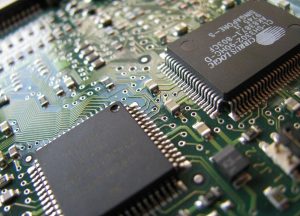Two years into the COVID-19 pandemic, the resulting global chip shortage, which hit automakers especially hard, shows no sign of easing despite manufacturers’ efforts to meet skyrocketing demand. Semiconductor technology has become an essential part of modern life with microchips, or ICs (integrated circuits), found in every electronic appliance, from basic household TV remotes to state-of-the-art missile defense military radars. As companies and governments around the world recognize the strategic importance of maintaining a resilient global supply chain and rally to secure supplies, many are coming to view the semiconductor shortage as a national security issue.
Thus, Japan has made a $6.8 billion investment, the EU is vowing to double its global market share by the year 2030, and the United States, too, is striving to achieve chip self-sufficiency. To that end, the U.S. is strengthening its domestic semiconductor ecosystem through legislation, including the Creating Helpful Incentives to Produce Semiconductors (CHIPS) for America Act within the U.S. Innovation and Competition Act (USICA) and the America COMPETES Act. While the House and the Senate are still in the process of reconciling their respective competition bills, companies are already lobbying for access to a share of the approved $52 billion in CHIPS Act subsidies.
Intel CEO Pat Gelsinger has advocated against making foreign firms eligible to apply for CHIPS grants, remarking that only companies with “deep American roots,” companies that are “based here,” are deserving of taxpayer support. Gelsinger goes on to paint a picture of Intel as the sole all-American semiconductor company capable of the type of leading-edge design and manufacturing crucial to promoting “innovation and IP in the U.S.”
This view sidesteps the fact that a good many industry leaders, direct competitors of Intel, are fabless American businesses using the foundry services of East Asian companies. These include Apple, which designs its own CPUs, as well as IC design companies NVIDIA, AMD, Qualcomm, and Broadcom. These U.S. firms have long developed partnerships with Asian counterparts like TSMC and Samsung, through which U.S. innovation and IP are preserved.
These East Asian semiconductor suppliers are responding to Washington’s call to bring manufacturing to America just as well, with TSMC breaking ground on a $12 billion Arizona semiconductor plant that will use the company’s advanced 5-nanometer production technology, and Samsung planning a $17 billion plant in Texas. This FDI shows that foreign players are committed to cultivating and fostering semiconductor clusters in the U.S. alongside American counterparts. Excluding them from the CHIPS Act grant would only disincentivize further investment.
Taiwan’s TSMC operates on a pure-play business model that strives to help companies all over the world – including U.S. companies – realize the commercial value and economic benefits of their IP development. In Japan, TSMC and Sony are jointly planning a $8.6 billion investment in a new fab, with approximately $3.49 billion reportedly being subsidized by the Japanese government in return for a pledge to maintain local production for at least 10 years, and to safeguard essential technology. This is an example of an open attitude toward FDI, coupled with clearly defined conditions, serving as the basis of a domestically beneficial, win-win international partnership. The United States could adopt a similar model.
Make no mistake: The chip shortage highlights an economic vulnerability as well as a national security issue. However, diversifying and securing supply chains is not the same as wholesale transplanting what the U.S. currently lacks to American soil, and cutting out potential international cooperation. The foundry business is here to stay and will continue to grow. Excluding East Asian companies that have long been integral parts of the development of the U.S. semiconductor industry will only harm the semiconductor ecosystem in America. Foreign partners are not only crucial links within the existing supply chain but should also be indispensable partners in Washington’s vision for a newer, more resilient global semiconductor alliance. In forging these links, being secure as well as being inclusive of trusted partners are both key to enduring success.

































